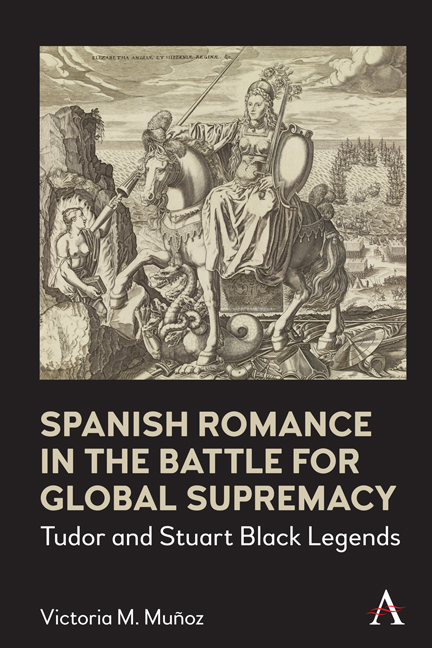Book contents
- Frontmatter
- Contents
- List of Figures
- Acknowledgments
- Prologue: Translating Romance, Empire, and Spain
- Chapter One “Books of the Brave” English: Spanish Tales of Love and Arms in Translation
- Chapter Two Dream Visions and Competing Dreams: Rewriting the Spanish Model in America
- Chapter Three Sun Kings and Moon Queens: The Courting and Uncourting of Spain
- Chapter Four Signs of England: Redcrosse Crosses the Ancient Boundary
- Chapter Five Believing Bottom’s Dream: Rationalizing Exploration from America to Australia
- Chapter Six Unruly Readers: Anti-Spanish Sentiment and the Feminizing of Romance
- Epilogue: Spanish Literature in England before Don Quixote
- Appendix I English Readership of Spanish Romance, By the Numbers
- Selected Bibliography
- Index
Chapter Five - Believing Bottom’s Dream: Rationalizing Exploration from America to Australia
Published online by Cambridge University Press: 22 February 2022
- Frontmatter
- Contents
- List of Figures
- Acknowledgments
- Prologue: Translating Romance, Empire, and Spain
- Chapter One “Books of the Brave” English: Spanish Tales of Love and Arms in Translation
- Chapter Two Dream Visions and Competing Dreams: Rewriting the Spanish Model in America
- Chapter Three Sun Kings and Moon Queens: The Courting and Uncourting of Spain
- Chapter Four Signs of England: Redcrosse Crosses the Ancient Boundary
- Chapter Five Believing Bottom’s Dream: Rationalizing Exploration from America to Australia
- Chapter Six Unruly Readers: Anti-Spanish Sentiment and the Feminizing of Romance
- Epilogue: Spanish Literature in England before Don Quixote
- Appendix I English Readership of Spanish Romance, By the Numbers
- Selected Bibliography
- Index
Summary
Sir Francis Bacon regarded Spain's progressive decline in the seventeenth century as a divine retribution for the country's cruelty and hubris. He noted that there was not one
of the first Conquerors, but died a violent Death himselfe, And was well followed by the Deaths of many more. Of Examples Enough: Except we should adde the Labours of Hercules: An Example, which though it be flourished with much Fabulous Matter, yet so much it hath, that it doth notably set forth, the Consent of all Nations, and Ages, in the Approbation, of the Extirpating, and Debellating of Gyants, Monsters, and Forreaine Tyrants, not onely as lawfull, but as Meritorious, euen of Diuine Honour.
Invoking translatio imperii, the Pillars of Hercules, so symbolic for Philip, appeared on the title page of Bacon's unfinished work, Instauratio Magna (Great Renewal), published in 1620. The work included his famous treatise of empiricism, Novum Organum, sive Indicia Vera de Interpretatione Naturae (New organum, or true directions concerning the interpretation of nature) which advocated a scientific method that was inspired by such luminaries as Leonardo da Vinci and Galileo Galilei. The pillars bore the following inscription: “Multi pertransibunt et augebitur Scientia” (Many will pass through and knowledge will be the greater). The frontispiece featured a Stuart vessel passing beyond the Pillars on voyage to America. The message, “many will pass,” constituted Bacon's “call to expand English science,” in order to “curtail Spanish dominance of overseas expansion.”
Nevertheless, while the Age of Exploration widened England's knowledge of the world, planting the seeds of an Age of Reason, it simultaneously prompted belief in the fabulous and improbable, including the exotic faerielands of contemporary romance. This chapter associates the return to faerieland with both the dominant reason (logic) and unreason (rumors, as propagated in poetry, romance, and ancient writings) that informed the geographical heurism of the seventeenth century, as evidenced by the 1652 Cosmographie in four bookes of Peter Heylyn. Reviving tales of classical warrior women and of dubious quests, from Amadís and Espejo to The Faerie Queene and Midsummer, Heylyn appealed to poetry's universality, using romance maxims in order to call upon England to expand its exploratory ventures in the project of global conquest.
Of Poets, Lovers, and Madmen
During the first Anglo-Spanish War of 1585 to 1604, there was a real and present need for madmen willing to dream of America.
- Type
- Chapter
- Information
- Spanish Romance in the Battle for Global SupremacyTudor and Stuart Black Legends, pp. 131 - 164Publisher: Anthem PressPrint publication year: 2021



